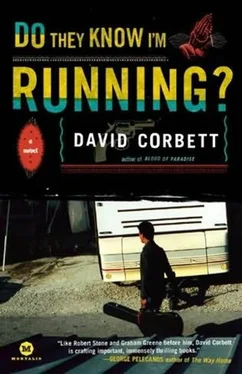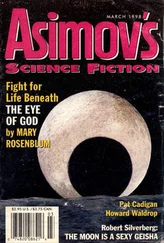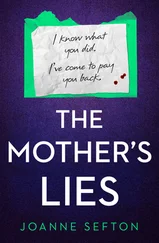Her eyes met his and yet he couldn’t feel himself within their gaze.- I’ve brought nothing but sorrow to your family .
– What’s happened, we brought on ourselves. Happy knows that better than anybody .
– It’s asking too much .
– You’re not asking anything. Now trust me .
He braced himself against one of the trees, lifted Melchior’s gun and steadied it, closing one eye, squinting to aim with the other. For the merest instant he revisited the day that Tío Faustino moved in, bringing his fourteen-year-old son along with him. He wasn’t known as Happy yet, that would come later, but even then he was cool and watchful and defiantly sullen. Godo hated him at first glance but that was Godo. Roque wondered if he’d bother to laugh if somebody told a joke. Tía Lucha made pozole for dinner, a hominy stew with chunks of pork, and no one spoke during the meal, spoons traveling from bowl to mouth uninterrupted except for Tío Faustino’s increasingly hopeless stabs at chat. At one point, Roque’s eyes rose from the table and he caught the taciturn newcomer, the boy named Pablo, staring. The eyes were black and deep and hard. Roque couldn’t help himself, maybe it was fear, maybe it was daring, maybe the simple human need to connect, but he smiled. And for a fleeting second he saw a softening in that unavailing gaze, the slightest lifting of the mask.
If I can just hit one of them, he thought, Happy will know I didn’t simply abandon him. The one in the suit presented the best target. If he missed, he might hit Happy, but he doubted whatever agony he caused would add much to what was sure to follow. He drew a bead, fixing the middle of the man’s chest in the V-shaped notch of the sight. He took in a breath, held it, pulling gently, slowly, three times in succession. As always, he was amazed at how loud it was. Even more astonishing, the one in the suit flinched and staggered and clutched at his neck, tripping over his own feet and toppling clumsily to the rocky ground as though suddenly butted by an invisible goat. The other two scattered, searching for cover.
I won’t stay and pretend I can do better than that, he thought. I won’t stick around and watch as they kill him. He turned toward Lupe. She was clutching her shoulder and the bloodstain on her shirt had grown beyond the spread of her hand. If we can get halfway by nightfall, he thought, we might have a chance. He no longer bothered with hope. Everything now reduced to will and luck. He took her free hand, pulled her behind him as he resumed their climb through the trees.- My cousin understands .
THE CHOPPER SET DOWN A HUNDRED YARDS FROM THE CIRCUS OF strobe lights swirling across the desert plain, the law-enforcement vehicles encircling a small enclave of unfinished houses, the capital of nowhere. Lattimore and the others aboard crouched and ran through the rotor wash and churning dust toward the nearest of the houses while the Mexican PC-6 that had escorted them since crossing the border tailed away, puttering off in a northerly loop.
It was just past sunset, not quite dark, the western sky a crimson fantasy of low swirled cloud getting swallowed up by night. He’d flown from San Francisco on a moment’s notice aboard an agency Gulfstream, a rare extravagance, arriving in Tucson a mere hour ago, met at the airstrip by an FBI liaison named Potter who’d steered him immediately to the helipad. They were joined there by a crew of ICE agents, like Lattimore wearing raid jackets with their agency affiliation emblazoned across the back, plus a few brush-cut military sorts Lattimore learned were DIA, two tight-lipped civilians who were clearly spooks, bringing Andy McIlvaine to mind-he’d dropped off the planet since their impromptu lunch-all of them sent here to lend some form of credibility to what he could only assume would be a dog and pony show of inimitable Mexican overkill.
They were met by a uniformed police officer who snapped to with a crisp salute, then led them through the idling crowds of chattering cops to the one roofed house in the tiny development, inside which a battery of tungsten lights transformed the shoddy interior into a brilliant if sordid photo shoot. Near the far wall, the bullet-riddled body of an Arabic-looking male lay sprawled in conspicuously little blood amid the scattered cinder blocks, the sawdust, the litter of nails. Beside him, in even worse shape if such a thing was possible, lay Happy Orantes’s cousin, the ex-marine with the torn-up face, Godo. The whisking hum and whirr of cameras battled with the rumble of generators and a wafting stentorian narrative provided by a jefe de grupo of the MFJP, the federal judicial police. The jefe , bedecked in stiffly creased khakis, hands clasped in the small of his back, appeared to be in control of the proceedings.
With the arrival of the Americans he took a break from his interview and swept forward, hand extended, face crafted into a catlike smile. The cameras followed him as though drawn by gravity. His name tape read “Orozco.”
“Welcome, gentlemen.” His English was soft, Southwestern. “I was just telling the members of the press about our operation, our good fortune in discovering a suspected terrorist before he was able to cross into your country.”
Lattimore only half listened to the rest-the anonymous tip that led them to this house, the fierce standoff and eventual commando assault, the regrettable but unavoidable death of the terrorist and a gang member who’d fought to protect him. Out of some nagging perversity he wanted to point out how obvious it was the bodies had been dragged in from somewhere else but doubted anyone would care much. The skin of the story would never get peeled back, no one wanted to see what festered underneath. It was one of those tales, the kind all sorts of people want too much to hear-why bother much over details? And though Lattimore finally had in his possession the paperwork from the Baghdad office that could lay waste to the vast edifice of bullshit the jefe was erecting, he lacked authority to share. The bureau wanted no part of making its efforts in this farce a matter of public record. Let the Mexicans claim victory. Let them raise the specter of terrorists at our door, without us or them having to prove much. The feigned threat served the purpose of truth-or what the geniuses in D.C. wanted known as truth. Besides, Lattimore knew he’d bargained on much the same indifference to what was real, what was pumped-up nonsense. There were no innocents in the room.
Regardless, it would matter only to him that a woman named Fatima Hassan with a teenage daughter named Shatha, both using forged papers and assumed names, had finally been located and interviewed at the refugee camp at Al Tanf. The pseudonyms accounted for the delay in proper identification. Fatima confirmed she was the widow of Salah Hassan, who had disappeared in the custody of the Mukhabarat when her daughter was a child. Her husband was charged with money laundering and never emerged from prison. She further confirmed, after evidence was provided, that she worked at a Baghdad brothel after her husband’s arrest, did so for some years, and that her forged identity papers had been provided by the criminal syndicate that ran the brothel and provided protection for her and the other women working there.
Asked if she knew of a Samir Khalid Sadiq, she conceded that she did; like her, he was part of the Palestinian community in Iraq. Pressed on the matter, she admitted as well that he had been a client, a particularly loyal one-obsessive, perhaps, was a better word, but his generosity not just to her but to her daughter had convinced her to look past his infatuation. She said she knew he had been a soldier during the war with Iran, was fluent in both English and Spanish, and worked for a local TV station translating news wire items or so he had always told her. After the U.S. invasion, he made a promise to help her emigrate to America. With the war’s dislocations, however, she lost touch with him.
Читать дальше












